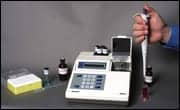On August 16, the The FDA approved new labeling information for the blood-thinner warfarin, sold under the brand name Coumadin. The new label suggests that one can prescribe higher or lower doses that may be safer for patients with variations in two genes, CYP2C9 or VKORC1. These variations can be learned through genetic testing, which may be a useful tool in determining appropriate dosing levels for individual patients with lower risks of bleeding complications.
“The FDA labeling change for warfarin is the next step in the pathway toward incorporating genetics into the care of patients who need anticoagulation,” said Marc S. Williams, MD, FACMG, ACMG board member and a cochair of the expert group on Pharmacogenetic Testing of CYP2C9 and VKORC1 Alleles for Warfarin Use. “The FDA has said that physicians should be aware of the role of genetics in warfarin dosing, but now the hard part is doing the necessary groundwork to determine how best to use genetic testing to improve care.”
This group is completing a report on the use of pharmacogenetic testing for warfarin and is based on a rapid-ACCE (analytic validity, clinical validity, clinical utility and ethical, legal and social implications) Review on Genetic Testing and Warfarin Dosing.



